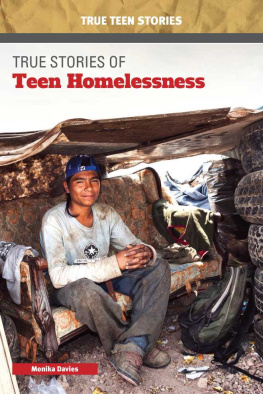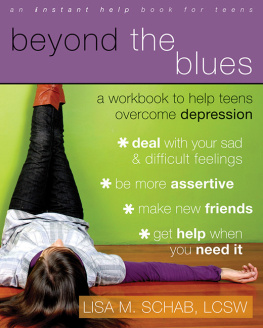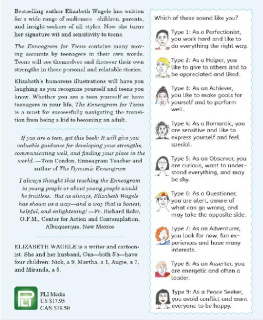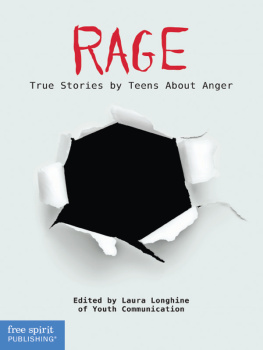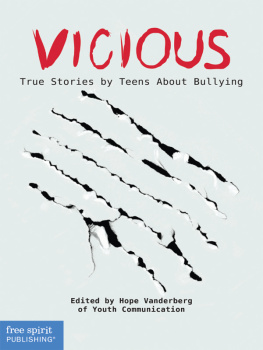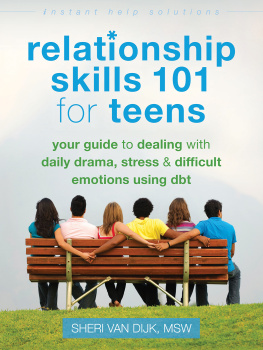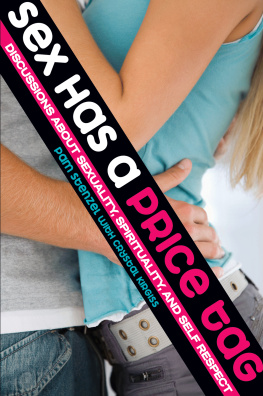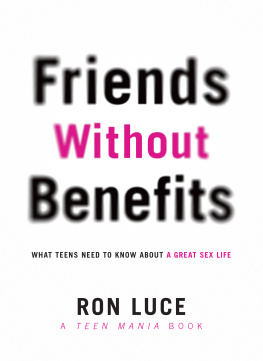Hear Me Out
Hear Me Out
True Stories of Teens Educating and Confronting Homophobia
A Project of Planned Parenthood of Toronto

Library and Archives Canada Cataloguing in Publication
Hear me out: true stories of teens educating and confronting homophobia / Teens Educating and Confronting Homophobia (T.E.A.C.H.).
Originally presented as part of T.E.A.C.H.s presentations to schools: Safely out.
ISBN 978-1-896764-87-0
i. Coming out (Sexual orientation) 2. Homophobia in high schools-Ontario--Toronto. 3. Gay teenagers-Ontario-Toronto.
I. Teens Educating and Confronting Homophobia (Youth group)
II. Title: Safely out.
HQ76.45.C32T67 2004 306.766 C2004-905266-7
Copyright 2004 by Planned Parenthood of Toronto
First published in the USA in 2005
Planned Parenthood is a member of the United Way of Greater Toronto
Edited by Frances Rooney
Front cover photograph and front cover design by Ariel P. Vente
Text design by L. McCurdy and P. Rutter
Typesetting by P. Rutter
Printed and bound in Canada
Second Story Press gratefully acknowledges the support of the Ontario Arts Council and the Canada Council for the Arts for our publishing program. We acknowledge the financial support of the Government of Canada through the Book Publishing Industry Development Program, and the Government of Ontario through the Ontario Media Development Corporations Ontario Book Initiative.

Published by
Second Story Press
20 Maud Street, Suite 401
Toronto, ON
M5V 2M5
www.secondstorypress.ca
Acknowledments
This collection was anthologized by a special editorial committee comprised of: Nadia Bello, Susan Flynn, Hazelle Palmer, Rico Rodriguez and Ariel Vente. Story editing by Rico Rodriguez and Nadia Bello.
Dedication
This anthology is dedicated to the T.E.A.C.H. volunteers whose stories fill the pages of this special collection; and to all T.E.A.C.H. volunteers past, present and future whose courage to speak out makes it possible for others to listen, opening their hearts and minds.
Foreword
We all know experiences. Puberty, sexual readiness and dating, developing our individual style, coping with relationships, with parents and friends all contribute to the roller coaster of experiences that help form who we are and who we will become. Discovering in the midst of all these shifts that you are attracted to people of your own gender or that you are not the same gender inside as outside can send the roller coaster off course.
Hear Me Out is a collection of unique and personal stories by volunteers with Torontos Teens Educating and Confronting Homophobia (T.E.A.C.H.), a peer-based program run by Planned Parenthood of Toronto (PPT) to educate and change negative attitudes about gay, lesbian, queer, bisexual, transsexual and transgendered people. From coming out to finding love, dealing with violence to internal homophobia, these voices speak to the specific difficulties of growing up queer.
When I was in high school I cant remember any deep and challenging discussions with my friends about homosexuality. The only time it came up, really, was when wed yell fag down the hall after a boy we didnt like or found effeminate. On reflection, the cruelty and homophobia are clear, but thirty years ago, these comments were just considered to be part of high-school life. I cant imagine what it must have been like for youth who were questioning their orientation and scared by our bullying.
The stories in this collection tell us very clearly what it is like: isolating, emotionally draining, frightening, sometimes empowering and supporting. Its hard to tell how much has really changed over the years. Are school environments today any safer for queer youth? Are name-calling, bullying, taunting, queer-bashing and violence still prevalent? Is there support for open discussions among youth about sexual orientation that challenges stereotypes, myths and perceptions?
About T.E.A.C.H.
T.E.A.C.H. was established in 1993 to raise awareness of these issues. Founded at a time when queer discrimination in high schools in the east end of Toronto was escalating, the program created a peer-based framework to challenge youth about their attitudes to gays, lesbians, bisexuals and transgender/transsexuals. PPT has run the program since 1997. We have very limited staff resources, some support from United Way of Greater Toronto and the Ontario Trillium Foundation and about twenty-five incredible volunteers each year, all truly committed to challenging homophobia and creating safer school and community environments.
When we adopted the program from East End Community Health Centre, T.E.A.C.H. was not like PPTs other programs, the core of which are sexual and reproductive health education and clinical services. However, because the effects of homophobia on self-esteem, body image and sexuality, and their link to violence are so clear, particularly for youth the connection to healthy sexuality is undeniable. There were also practical reasons for the adoption. We could make T.E.A.C.H. available to city-wide audiences and use our strong reputation for fundraising to advocate for the increased financial resources that could stabilize the program. And with T.E.A.C.H. as part of our PPT programs, we could better diversify our client base to reach more queer-identified youth. Planned Parenthood of Toronto was ready for the challenge; was everyone else ready for T.E.A.C.H.?
Linking anti-homophobia to healthy sexuality has been our greatest stumbling block. Some people and funders believe that social or community-based services should be compartmentalized or specialized, ought to focus, for example, on sexual health, anti-violence or anti-homophobia education. Not all three. However, we approach our work at Planned Parenthood of Toronto from a holistic perspective, easily connecting how the social determinants of health directly impact our capacity to live well and be healthy. It is impossible for us to speak about healthy sexuality and not consider how that affects anyone who is lesbian, gay, bisexual or transgender/transsexual (LGBT). How could we argue for the right of informed decision making when we do not include the right to disclose ones sexual orientation without fear of bias or judgment? How could we proudly support pro-choice values and beliefs and not recognize the barriers that exist for LGBT people to exercise choice in their daily lives?
T.E.A.C.H. is helping to break down those barriers or at least, as its name implies, is confronting the cause. Each year T.E.A.C.H. volunteers undergo a seven-session training program to equip them for the questions and reactions they will face when speaking to classrooms filled with young and eager minds. The volunteers, who identify as gay, lesbian, bisexual, transgender and straight allies, and who range in age from fifteen to twenty-three, share their own personal stories. This approach has proved to be successful in helping youth to make connections with their audience and to resonate with other youth who may be questioning their orientation. Volunteers are also trained to support the youth when conducting workshops. These support volunteers assist in facilitation, help debrief workshops and give feedback to PPTs program staff. Although some participants still refuse to be engaged or to shift their thinking, evaluations from these sessions have recorded definite changes in perceptions and attitudes by many of the participants.
Next page

